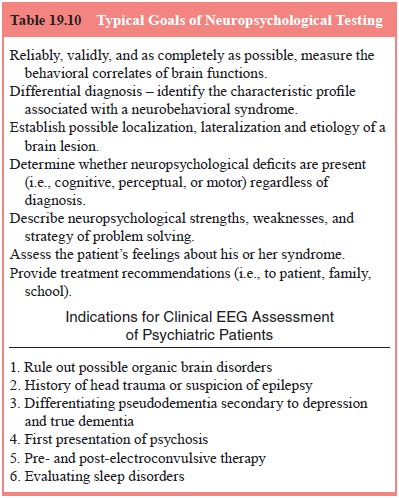Chapter: Essentials of Psychiatry: Clinical Evaluation and Treatment Planning: A Multimodal Approach
Neuropsychological Examination Compared with Other Examinations
Neuropsychological Examination
Compared with Other Examinations
Neuropsychological testing provides information
regarding di-agnosis; cognitive, perceptual and motor capacities or deficits;

and treatment recommendations (Table 19.10).
Experienced clini-cians use test data to determine the presence or absence of
brain dysfunction, to localize the damage, and to establish the etiol-ogy
(Milberg et al., 1996). Moreover, a
comprehensive functional assessment can lead to neurologically meaningful
subgroups of disorders (as in different types of developmental disorders,
ver-bal and nonverbal) that may have relevance to treatment, such as in the
application of different strategies of cognitive rehabilita-tion or school
placement (Weinstein and Seidman, 1994).
All neuropsychological approaches assess some
aspects of intelligence, reasoning and abstraction, attention (sustained and
selective), “executive’’ and self-control functions (set shift-ing, planning
and organizational capacity), learning and mem-ory (e.g., working memory,
declarative), language, perceptual (i.e., auditory and visual) and
constructional tasks, and sensory and motor functions. Comprehensive test
batteries can be quite lengthy, because the human brain–behavior relationship
is quite complex. Test data are interpreted in the context of many factors
including the age, sex, education, and handedness of the patient.
Related Topics